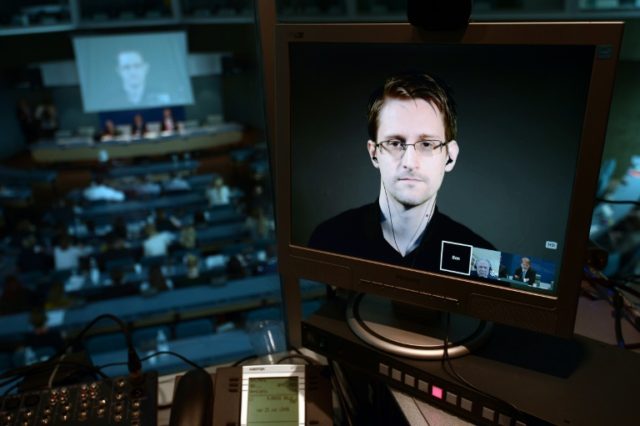The House Permanent Select Committee on Intelligence is detailing the effects of Edward Snowden’s disclosures.
He leaked about how the U.S. government monitored the communications of American citizens and foreign leaders.
“I’m gratified that, with the completion of the declassification review, the American people can now get a fuller account of Edward Snowden’s crimes and the reckless disregard he has shown for U.S. national security, including the safety of American servicemen and women,” said Rep. Devin Nunes (R.-CA), the chairman of the committee.
“It will take a long time to mitigate the damage he caused, and I look forward to the day when he returns to the United States to face justice,” the chairman said.
The report contradicts the popular image of Snowden as a Robin Hood stealing government secrets and sharing them with the uninformed for the greater good.
Instead, the report describes Snowden, who was a contract employee working for the CIA as a telecommunications information systems officer, as fabricator and serial exaggerator, who often argued with supervisors–and who in November 2006, less than three months into the job, was already contacting the CIA’s Office of the Inspector General about his boss’s targeting him.
An example of his troublesome behavior cited in the report is how he handled a failed attempt at a promotion:
A few months after starting in [redacted], Snowden asked to apply for a more senior position in [redacted] as a regional communications officer. His supervisor did not endorse his application. When he was not selected for the position, Snowden responded by starting ‘a controversial e-mail exchange with very senior officers’ in which he questioned the selection board’s professional judgement.
The report exhaustively tracks downs Snowden’s statements and refutes them, such as going through records of his counseling and correspondence to find no evidence that Snowden ever expressed qualms about the morality of the surveillance programs or working for the CIA.
Investigators also interviewed Snowden’s former colleagues and supervisors, who contradicted the TISO’s claims that he was singled out for more responsibility or promotion. On supervisor told investigators that between October 2007 and April 2008, he counseled Snowden six times about his behavior at work.
“The Committee further found no evidence that Snowden attempted to communicate concerns about the legality or morality of intelligence activities to any officials, senior or otherwise, during his time at either CIA or NSA,” according to the report.
In fact, the report makes the strong suggestion that Snowden used his hacking to cheat: “In September 2012, [Snowden] took a test to obtain a position in the Tailored Access Operations office, or TAO, the group within NSA responsible for computer network exploitation operations. After finding the test and its answers among the documents he had taken off NSA networks, he passed the test.”
The report also takes issue with Snowden’s claims that he was motivated by a concern for civil liberties: “Most of the material he stole had nothing to do with Americans’ privacy, and its compromise has been of great value to America’s adversaries and those who mean to do America harm,” he said. “Whistleblowers are important to proper oversight and we will protect them from retaliation, and those who engage in civil disobedience are willing to stay and face the consequences.”
The committee’s top Democrat Rep. Adam B. Schiff (D.-CA) said he took issue with Snowden being championed as a whistle blower.
“Snowden and his defenders claim that he is a whistle blower, but he isn’t, as the committee’s review shows,” he said.
“Most of the material he stole had nothing to do with Americans’ privacy, and its compromise has been of great value to America’s adversaries and those who mean to do America harm,” he said. “Whistle blowers are important to proper oversight and we will protect them from retaliation, and those who engage in civil disobedience are willing to stay and face the consequences.”
NSA and Cybersecurity Subcommittee Chairman Rep. Lynn Westmoreland (R.-Ga.) said, “The American people have every right to know the extent of the damage Edward Snowden did to our national security, and I applaud the declassification of the House Intelligence Committee’s report.”
Westmoreland said the damage done by Snowden was real.
“Not only did Snowden endanger American servicemembers, threaten critical relationships across the globe, and reduce our allies’ ability to counter terror attacks, but repairing the damage he did cost a tremendous amount of taxpayer dollars and more importantly, used up valuable time and resources that should be spent keeping our country safe,” he said.
“This extensive report shows Snowden is no hero, and that he should be brought to justice for his reckless actions.”

COMMENTS
Please let us know if you're having issues with commenting.